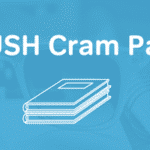No matter how much time you’ve devoted to your APUSH exam review, once your exam date approaches you enter the world of last minute test prep. Although there are no quick tricks to ensure a passing score, there are guidelines you can follow to make sure you are performing at the top of your academic skill level.
Use our five last minute test prep suggestions to help you finish strong and test your best.
Test Prep Tip #1: Keep studying
Even if you feel that you know all the information, it is a good idea to continue reviewing for your APUSH exam. This isn’t a time to learn new material. Instead, aim for a quick overview of a time period, historical event or major concept. Daily 30-minute study sessions will help keep APUSH exam information fresh in your mind. You can also use our APUSH study plans to stay organized.
Unless you have a preferred method for studying that works for you like nothing else, you can use your APUSH course notes to study. Use your class notes as a study guide outline: Review each chapter chronologically to make sure you are familiar with each section of APUSH material that may appear on your exam. If you want to incorporate other materials, our APUSH cram packet has other suggested resources.
Test Prep Tip #2: Practice writing by hand
Why should you include writing as part of your APUSH exam review? There are three different types of essays that appear on the APUSH exam: short answer questions, a data-based question and one long essay. You write every single one of these essays by hand. If you are a student who generally takes notes on a tablet or laptop, writing for an extended period of time can be difficult. Hand cramps are no joke!
Prepare yourself by writing an essay every day. Find a prompt, set a timer for 45 minutes and start writing! Focus not only on the content (of course, you want a quality essay when finished) but also on the physical position of your body. Make sure your back is nice and straight, your shoulders are rolled back and your writing hand is relaxed.
Having trouble locating a prompt? Hundreds of prompts for all three essay types are available online, but your best bet is to visit AP College Board for the most up-to-date free response questions.
Test Prep Tip #3: Review the APUSH exam expectations
No matter how much content you know, if you don’t answer a question completely or in the correct format, you run the risk of losing valuable points. Don’t let silly mistakes lower your overall exam score. Use some of your APUSH exam review time to brush up on how each section of the APUSH exam is scored. For complete scoring information, read AP College Board’s Course & Exam Description, beginning on page 129.
Section I: Part A – multiple choice
55 questions = 40% of exam score total
Answering these questions is no big deal. Choose the best option from up to 4 choices. Just be sure to fill in the bubble completely with your #2 pencil.
Section I: Part B – short answer
3 questions = 20% of exam score total
Questions 1 and 2 are required (both focus on periods 3-8). However, you can choose between Question 3 (periods 1-5) and Question 4 (periods 6-9), depending on which periods you prefer. Each question prompt is divided into three parts: A, B, and C. Each individual part is worth 1 point, for a total of 3 points.
Each part is scored separately, so if you miss part A, it doesn’t necessarily mean the rest of your short answer is incorrect. Use complete sentences when answering these questions.
Section II: Part A – data-based
1 question = 25% of exam score total
This question focuses on periods 3-8, and is worth a maximum of 7 points. Official APUSH exam readers look for a clear thesis and development of your argument. Your essay must include evidence from the historical documents provided.
In addition to providing your own outside evidence, also extend your argument by connecting material across historical themes and content. Although taken from the 2016 APUSH exam, AP College Board’s scoring guidelines still contain relevant scoring information.
Section II: Part B – long essay
1 question = 15% of exam score total
Choose one from three prompt options, each focusing on a different period:
- Option 1: periods 1-3
- Option 2: periods 4-6
- Option 3: periods 7-9
A quality long essay response looks very much like your typical school paper. Make sure you include a thesis, develop your argument using evidence, and synthesize concepts across themes.
Each area of your paper is scored separately, for a total of 6 possible points. Read through the scoring guidelines for the long essay response for more in-depth information.
Test Prep Tip #4: Take even better care of yourself in the days prior to testing
Like studying, cramming a “healthy” lifestyle into the night before your APUSH exam isn’t really going to make a difference. In order to reap the benefits of being well-rested on test day, start making healthier changes at least a week before your test. This means getting to bed on time, drinking lots of water, and start eating a light breakfast (if you don’t already).
These small changes may not seem like much, but can pay off big when you test. A well-rested body = a calm and prepared mind. Go into your test knowing that your body and brain are functioning at peak performance.
Test Prep Tip #5: Act confident, be confident
Show confidence in yourself. Your hours of APUSH exam review are finally going to pay off! Walk confidently into your testing classroom knowing you are as prepared as you can be. Believe in yourself and your academic skills!
Ned More APUSH Exam Review Tips?
For even more APUSH exam review tips, check out these tips from AP College Board and the Magoosh APUSH blog.
When is your exam date? Which of these prep tips will you be incorporating into your APUSH exam review?



Leave a Reply